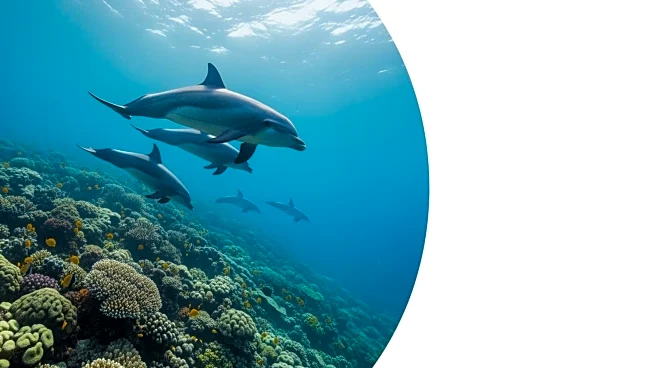What's Happening?
Marine scientists have raised alarms over the declining lifespan of common dolphins in the North Atlantic, as reported in a study published in Conservation Letters. The research, conducted by the University
of Colorado Boulder, reveals that female common dolphins are now living an average of seven years less than they did in 1997. This decline poses a threat not only to the species but also to the ocean ecosystems they support. The study highlights the impact of bycatch, where dolphins are unintentionally caught in fishing operations, particularly in the Bay of Biscay, a key winter habitat for these dolphins. In 2021, bycatch was responsible for the deaths of approximately 6,900 dolphins in this region. Traditional monitoring methods have failed to capture the full extent of the decline, prompting researchers to analyze stranded dolphins to better understand survival trends.
Why It's Important?
The decline in dolphin populations has significant implications for marine ecosystems, as dolphins play a crucial role as top predators. Their reduced numbers could lead to imbalances in fish populations, potentially causing a collapse in the ecosystem. The study's findings underscore the need for improved management and protection measures to prevent further decline. The French government's recent implementation of a one-month annual fishing ban in the Bay of Biscay is a step towards addressing the issue, but researchers suggest that aligning the ban with dolphin migration patterns could enhance its effectiveness. The situation also highlights the importance of international marine protection policies, such as the US Marine Mammal Protection Act, in safeguarding marine biodiversity.
What's Next?
Future actions may include adjusting fishing bans to better coincide with dolphin migration patterns, as well as enhancing international cooperation to strengthen marine protection policies. Researchers emphasize the urgency of taking informed action to prevent further decline in dolphin populations and to maintain the health of marine ecosystems. The study's findings could also prompt further research into the pressures faced by other North Atlantic cetaceans, potentially leading to broader conservation efforts.
Beyond the Headlines
The study highlights the ethical responsibility of humans to protect marine life and ecosystems. The decline in dolphin populations serves as a reminder of the interconnectedness of species and the potential consequences of human activities on biodiversity. The research also underscores the importance of using innovative methods, such as analyzing stranded animals, to gain insights into population health and inform conservation strategies.









